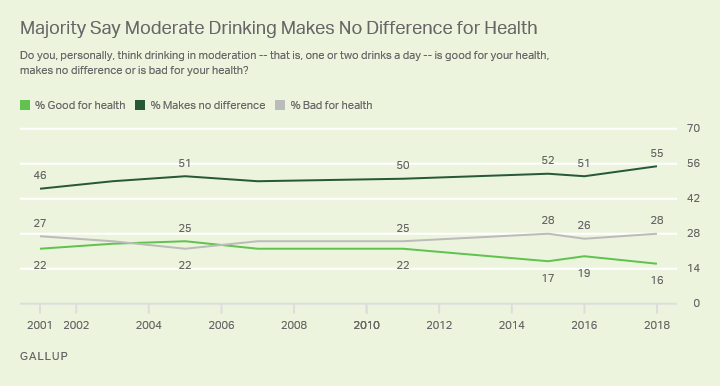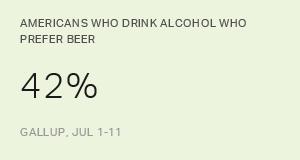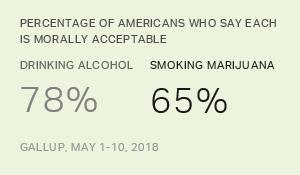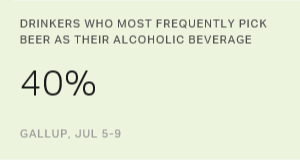Story Highlights
- 16% say drinking in moderation is good for health; 28% bad
- 55% say moderate drinking makes no difference
- Drinkers more positive on health effects than abstainers
WASHINGTON, D.C. -- While the majority of Americans (55%) think that drinking in moderation makes no difference to their health, the percentage who say it is bad for one's health outweighs those who say it is good, 28% to 16%. Over time, Americans have become slightly less likely to say moderate drinking is healthy.

These results, from Gallup's July 1-11 annual update on alcohol consumption, are based on a question that defines drinking in moderation as "one or two drinks a day," and comes at a time of a general lack of consensus in the medical community on the effects of moderate drinking.
The well-established downsides of excessive drinking -- 37% of Americans say drinking has been a cause of trouble in their families -- make authorities cautious about positive recommendations on moderate drinking. On one hand, substantial medical research has shown in the past that people who drink moderately live longer and that alcohol seems to have a positive impact on limiting cardiovascular disease. But other research shows that even moderate drinking may be related to higher probabilities of getting some forms of cancer.
Even though the majority of Americans have occasion to use alcohol, relatively few are convinced that moderate drinking is good for their health. Somewhat more say it is bad for their health, but the majority who say moderate drinking doesn't have an effect either way underscores the lack of strong consensus among Americans on the issue. Of course, adding the 55% who say moderate drinking makes no difference to the 28% who say it has negative health consequences yields a substantial majority of more than eight in 10 Americans who don't believe that moderate drinking is healthful. At the same time, a clear majority also don't believe it is bad for their health.
Not surprisingly, those who drink alcohol (63% of the U.S. adult population) are more likely than abstainers to say moderate drinking is healthy and less likely to say it is bad for one's health. But even drinkers aren't strongly likely to view moderate drinking as healthy, and essentially just break even in seeing drinking as healthful versus harmful. Total abstainers, by contrast, are more than four times as likely to say drinking is harmful as healthful.
| Moderate drinking good for your health |
No difference | Moderate drinking bad for your health |
||||||||||||||||||||||||||||||||||||||||||||||||||||||||||||||||||||||||||||||||||||||||||||||||||
|---|---|---|---|---|---|---|---|---|---|---|---|---|---|---|---|---|---|---|---|---|---|---|---|---|---|---|---|---|---|---|---|---|---|---|---|---|---|---|---|---|---|---|---|---|---|---|---|---|---|---|---|---|---|---|---|---|---|---|---|---|---|---|---|---|---|---|---|---|---|---|---|---|---|---|---|---|---|---|---|---|---|---|---|---|---|---|---|---|---|---|---|---|---|---|---|---|---|---|---|---|
| % | % | % | ||||||||||||||||||||||||||||||||||||||||||||||||||||||||||||||||||||||||||||||||||||||||||||||||||
| Have occasion to use alcoholic beverages | ||||||||||||||||||||||||||||||||||||||||||||||||||||||||||||||||||||||||||||||||||||||||||||||||||||
| Yes | 20 | 56 | 23 | |||||||||||||||||||||||||||||||||||||||||||||||||||||||||||||||||||||||||||||||||||||||||||||||||
| No | 8 | 53 | 37 | |||||||||||||||||||||||||||||||||||||||||||||||||||||||||||||||||||||||||||||||||||||||||||||||||
| Sometimes drink more than you should (among drinkers) | ||||||||||||||||||||||||||||||||||||||||||||||||||||||||||||||||||||||||||||||||||||||||||||||||||||
| Yes | 13 | 64 | 23 | |||||||||||||||||||||||||||||||||||||||||||||||||||||||||||||||||||||||||||||||||||||||||||||||||
| No | 22 | 53 | 23 | |||||||||||||||||||||||||||||||||||||||||||||||||||||||||||||||||||||||||||||||||||||||||||||||||
| Drinking cause of trouble in your family | ||||||||||||||||||||||||||||||||||||||||||||||||||||||||||||||||||||||||||||||||||||||||||||||||||||
| Yes | 17 | 47 | 35 | |||||||||||||||||||||||||||||||||||||||||||||||||||||||||||||||||||||||||||||||||||||||||||||||||
| No | 16 | 59 | 24 | |||||||||||||||||||||||||||||||||||||||||||||||||||||||||||||||||||||||||||||||||||||||||||||||||
| GALLUP, July 1-11, 2018 | ||||||||||||||||||||||||||||||||||||||||||||||||||||||||||||||||||||||||||||||||||||||||||||||||||||
Those who have had problems with drinking -- either personally or within their family -- are modestly more cautious about moderate drinking than others. Drinkers who admit that they sometimes drink more than they should are less likely than other drinkers to say moderate drinking is healthy. Those who say drinking has been a cause of trouble in their family are somewhat more likely to say moderate drinking is harmful than are those for whom drinking hasn't caused trouble.
There are few meaningful differences in attitudes about the effects of moderate drinking by major demographic group. Americans under age 35 are somewhat more likely to say moderate drinking is harmful rather than healthy. One's level of formal education seems to make little difference in these views.
| Moderate drinking good for health |
No effect | Moderate drinking bad for health |
||||||||||||||||||||||||||||||||||||||||||||||||||||||||||||||||||||||||||||||||||||||||||||||||||
|---|---|---|---|---|---|---|---|---|---|---|---|---|---|---|---|---|---|---|---|---|---|---|---|---|---|---|---|---|---|---|---|---|---|---|---|---|---|---|---|---|---|---|---|---|---|---|---|---|---|---|---|---|---|---|---|---|---|---|---|---|---|---|---|---|---|---|---|---|---|---|---|---|---|---|---|---|---|---|---|---|---|---|---|---|---|---|---|---|---|---|---|---|---|---|---|---|---|---|---|---|
| % | % | % | ||||||||||||||||||||||||||||||||||||||||||||||||||||||||||||||||||||||||||||||||||||||||||||||||||
| Gender | ||||||||||||||||||||||||||||||||||||||||||||||||||||||||||||||||||||||||||||||||||||||||||||||||||||
| Men | 18 | 56 | 25 | |||||||||||||||||||||||||||||||||||||||||||||||||||||||||||||||||||||||||||||||||||||||||||||||||
| Women | 14 | 53 | 31 | |||||||||||||||||||||||||||||||||||||||||||||||||||||||||||||||||||||||||||||||||||||||||||||||||
| Age | ||||||||||||||||||||||||||||||||||||||||||||||||||||||||||||||||||||||||||||||||||||||||||||||||||||
| 18-34 | 12 | 54 | 34 | |||||||||||||||||||||||||||||||||||||||||||||||||||||||||||||||||||||||||||||||||||||||||||||||||
| 35-54 | 16 | 56 | 26 | |||||||||||||||||||||||||||||||||||||||||||||||||||||||||||||||||||||||||||||||||||||||||||||||||
| 55+ | 18 | 54 | 26 | |||||||||||||||||||||||||||||||||||||||||||||||||||||||||||||||||||||||||||||||||||||||||||||||||
| Education | ||||||||||||||||||||||||||||||||||||||||||||||||||||||||||||||||||||||||||||||||||||||||||||||||||||
| High school or less | 15 | 54 | 30 | |||||||||||||||||||||||||||||||||||||||||||||||||||||||||||||||||||||||||||||||||||||||||||||||||
| College | 17 | 55 | 27 | |||||||||||||||||||||||||||||||||||||||||||||||||||||||||||||||||||||||||||||||||||||||||||||||||
| GALLUP, July 1-11, 2018 | ||||||||||||||||||||||||||||||||||||||||||||||||||||||||||||||||||||||||||||||||||||||||||||||||||||
Bottom Line
"When you hold all [background] factors constant, what we and many, many others have found is that drinking in moderation … is beneficial, and people who drink in moderation live longer." That was the conclusion of Dr. Eric Rimm of Harvard Medical School and the Harvard School of Public Health -- and a noted authority on the health consequences of lifestyle choices -- on a recent ���۴�ýpodcast.
But Rimm noted that making a decision on drinking needs to be done in conjunction with all other background factors, particularly those related to cancer. And he, like most other authorities, does not advocate taking up drinking just for its presumed health benefits.
The Mayo Clinic maintains a similar stance, stating that "moderate alcohol use has possible health benefits, but it's not risk-free," while the official government guidelines on diet and nutrition firmly state that "The Dietary Guidelines does not recommend that individuals who do not drink alcohol start drinking for any reason."
Adopting a more negative tone than other authorities, the government's Centers for Disease Control and Prevention says: "Although past studies have indicated that moderate alcohol consumption has protective health benefits (e.g., reducing risk of heart disease), recent studies show this may not be true. While some studies have found improved health outcomes among moderate drinkers, it's impossible to conclude whether these improved outcomes are due to moderate alcohol consumption or other differences in behaviors or genetics between people who drink moderately and people who don't."
Given the caution among health authorities -- informed by the understanding that drinking in excess has potentially dangerous consequences -- it makes sense that most Americans are not convinced that moderate drinking in and of itself would be good for their health. On the other hand, the majority of Americans, including drinkers particularly, don't think that moderate drinking is bad for their health either.
These findings are consistent with recommendations that Americans may want to drink alcohol in moderation for personal pleasure and social reasons, but that they not choose to do so because it will benefit their health.
Survey Methods
Results for this ���۴�ýpoll are based on telephone interviews conducted July 1-11, 2018, with a random sample of 1,033 adults, aged 18 and older, living in all 50 U.S. states and the District of Columbia. For results based on the total sample of national adults, the margin of sampling error is ±4 percentage points at the 95% confidence level. All reported margins of sampling error include computed design effects for weighting.
Each sample of national adults includes a minimum quota of 70% cellphone respondents and 30% landline respondents, with additional minimum quotas by time zone within region. Landline and cellular telephone numbers are selected using random-digit-dial methods.
View survey methodology, complete question responses and trends.
Learn more about how the works.




